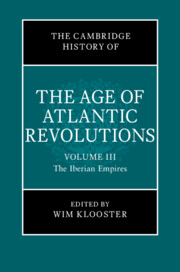Book contents
- The Cambridge History of the Age of Atlantic Revolutions
- The Cambridge History of the Age of Atlantic Revolutions
- The Cambridge History of the Age of Atlantic Revolutions
- Copyright page
- Contents
- Figures
- Maps
- Tables
- Contributors to Volume III
- Preface
- Introduction
- Part I The Spanish Empire
- Part II Brazil, Portugal, and Africa
- 16 Overview: The Independence Era in the Luso-Brazilian World
- 17 Portugal’s Social and Political Change from the Ancien Régime to Liberalism
- 18 Conservative Tracks toward Independence: Transfer of the Court to Rio de Janeiro, the Porto Revolution, and Brazilian Autonomy
- 19 Building New Brazilian Institutions
- 20 Slaves, Indians, and the “Classes of Color”: Popular Participation in Brazilian Independence
- 21 Brazil and the Independence of Spanish America: Parallel Trajectories, Linked Processes (1807–1825)
- 22 Waves of Sedition across the Atlantic: Liberal Politics in Angola in the Wake of Brazilian Independence (c. 1817–1825)
- Index
18 - Conservative Tracks toward Independence: Transfer of the Court to Rio de Janeiro, the Porto Revolution, and Brazilian Autonomy
from Part II - Brazil, Portugal, and Africa
Published online by Cambridge University Press: 20 October 2023
- The Cambridge History of the Age of Atlantic Revolutions
- The Cambridge History of the Age of Atlantic Revolutions
- The Cambridge History of the Age of Atlantic Revolutions
- Copyright page
- Contents
- Figures
- Maps
- Tables
- Contributors to Volume III
- Preface
- Introduction
- Part I The Spanish Empire
- Part II Brazil, Portugal, and Africa
- 16 Overview: The Independence Era in the Luso-Brazilian World
- 17 Portugal’s Social and Political Change from the Ancien Régime to Liberalism
- 18 Conservative Tracks toward Independence: Transfer of the Court to Rio de Janeiro, the Porto Revolution, and Brazilian Autonomy
- 19 Building New Brazilian Institutions
- 20 Slaves, Indians, and the “Classes of Color”: Popular Participation in Brazilian Independence
- 21 Brazil and the Independence of Spanish America: Parallel Trajectories, Linked Processes (1807–1825)
- 22 Waves of Sedition across the Atlantic: Liberal Politics in Angola in the Wake of Brazilian Independence (c. 1817–1825)
- Index
Summary
The escape of the Portuguese royal family to Rio de Janeiro in 1807-8 proved a decisive step towards Brazilian political emancipation. The encounter of the Portuguese court and state with the wealthy slave elite residing in the capital of the colony was a turning point for all players. In the following thirteen years, the Portuguese court would define both the course of liberalism in Portugal and the political independence of Brazil, proclaimed soon after the return of the King of Portugal to Europe in 1821. The relationship between the court and Rio de Janeiro’s aristocracy, which financed the former, occurred through the strict observance of a social etiquette that was indifferent to the conditions of the new tropical setting. The history of both Portugal and independent Brazil throughout the nineteenth century was established there.
- Type
- Chapter
- Information
- The Cambridge History of the Age of Atlantic Revolutions , pp. 474 - 495Publisher: Cambridge University PressPrint publication year: 2023

